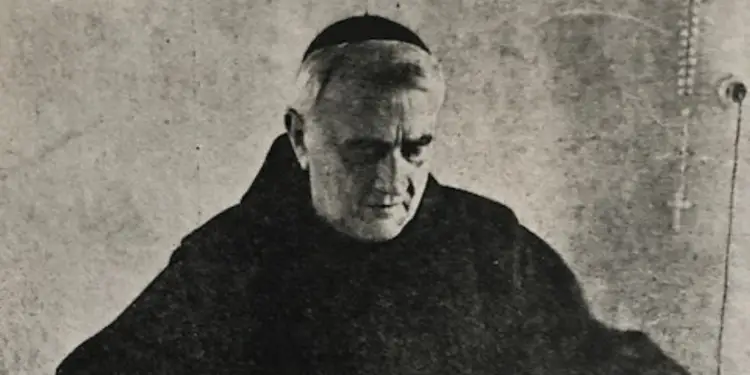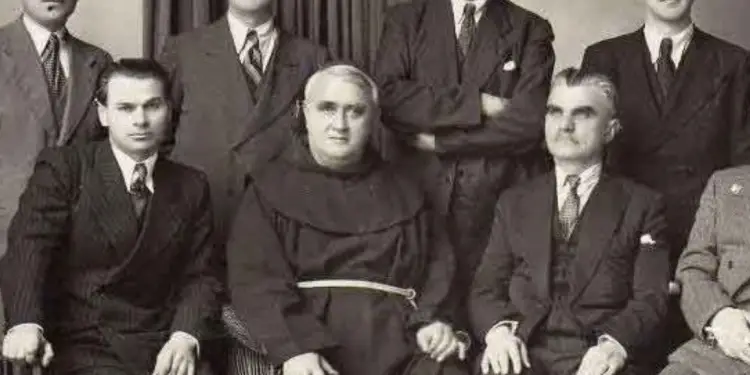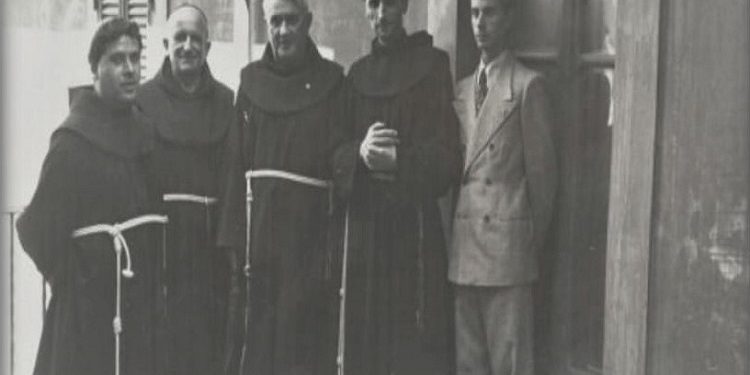By Violeta Murati
Memorie.al / With the signature: Fondi 17, file 18, without year, but which corresponds to the nominal fund of Gjergj Fishta, from the Central State Archive, a few years ago, it came to light for the first time that there is an ideological, philosophical, and theological treatise written by Father Fishta, but unknown until now. With the name “Questione nacionale e questione catholica”, the manuscript is kept in the AQSH. Meanwhile, the acquaintance with this important manifest documentation was announced by the former director of the AQSH, Shaban Sinani. At the scientific conference “Albanian Thought and Albanian School”, it can be said that the unknown manuscript of Father Gjergj Fishta was a surprise.
Sinani linked this discovery to the Albanian Franciscan friars, who had a common cultural environment, a center of action (Shkodra), a platform for expression (“Hylli i Dritës”), a master through whom they could identify, Father Gjergj Fishta, and a slogan that served as a moral principle for “Faith and Fatherland”, thus creating the movement and school of thought, transformed into a factor in the relationship between faith and national consciousness. The information provided by Mr. Sinani, of course, based on the use of the document he found in the archive, where he informs us that the author began writing it in 1914, calling it a finished work in 1924.
“The manuscript contains about 30 pages of autograph text, on which the author himself has made changes and corrections from time to time. The basic text was apparently written within a short time, within the same historical-cultural context. It is written entirely with a masterful calligraphy, an expression of the author’s calm, prudence and conviction in what he was writing. No sign of psychological distress is observed in the seismography of the writing.
The overtext, which is by the same hand, is in the form of marginal notes, additions and rarely even reprimands. The overtext seems to be inter-temporal, which can be taken as evidence that Father Gjergj Fishta has taken up his study several times. As for the overtext, it expresses a state less peaceful psychological states”, – Sinani expressed, through his statement; “Faith and nationality, in an unpublished work of Father Gjergj Fishta”.
It is known that the manuscript is of a larger format than official sized paper, with numbered sheets; ‘recto e verso’, by the author himself. “It is a lined paper and filled with text even in the blanks left as such by him at the beginning. In addition to the author of this treatise, the manuscript was also mentioned by Prof. Ali Xhiku, in his study; “Albanian Literature as Polyphony”, insofar as it was in the interest of that study, mainly for the verification of the content of Fishta’s poetic credo, expressed in the inseparable phrase; “Faith of the Father”. According to Sinani, this text is proven to have been consulted by other scholars, both local and foreign, but for three periods, it has been kept silent, which relate to before and after the Second World War, as well as in the last two decades.
Now a researcher at the Institute of Linguistics, Shaban Sinani, sheds light on the first signs of a textual analysis, telling us that; “starting from the language in which it was written, Italian, it can be thought that Father Gjergj Fishta wrote this text as a report for the Pontificate, to make known the demo-religious situation in Albania, immediately after the formation of the Albanian state”.
But what Sinan concluded is that this manuscript contains all the qualities of a report such as: a realistic description of the situation, a prediction of what could happen to the Albanians after the separation from the former Ottoman Empire and some advice on how Catholicism could be factored in to restore its authority in the Balkans, as in the pre-Ottoman period and at the same time, how this new situation could be useful to the Albanians, to Europeanize their thought, orientation and culture. But what leaves the researcher in doubt is the fact whether this document is a concept of a report, a memorandum or a philosophical-political treatise.
Sinan claims that; “it is not excluded that it could have really been a ‘memorandum’ as a reminder to the League of Nations, which delegated the Albanian issue to the Conference of Ambassadors and the latter recognized some protectorate rights to Italy over Albania, marked on a document already published by historical researchers, according to which Italy would be the guarantor of Albania’s external security, the defender of its internal sovereignty, the controller of the security of government – which caused a categorical rejection of the Balkan countries, to the extent that Albania was declared an extra-Balkan territory and not invited to the conferences of the region’s federation.
There is a logical connection between the two facts: as long as Rome had this package of international privileges over Albania, it was not excessive to remind it that the religious factor could also be taken into consideration in all its actions”. To confirm this historical reality, if it existed as is assumed – that it was forwarded to an official instance, such as the Holy See, or the League of Nations – the researcher states that they have not yet found a convincing, evidentiary answer.
The text is in Italian and according to Sinan, the author’s reluctance to publish it in Albanian, when he had all the possibilities, goes against one reasoning; that this letter could have been addressed to an Albanian.
“Fishta was a cleric, unlike Konitza and Schiro, who as secular people could more easily enter the circle of intentional misunderstanding, if we refer to the degree of tolerance that was evident at that time, following the homogenizing romanticism. The truth is that 7-8 decades later, in the land of a population coming from atheism, the ideas of re-Christianization also put the writer Ismail Kadare at the center of the attack. For all these reasons, we are inclined to treat this manuscript as a historical-philosophical treatise on the relationship between nationality and faith among Albanians”.
Throwing out the conceptual dilemma, why this document is a treatise, Sinani notes that there, the problems are posed in a principled manner, and the solutions are proposed in a paradigmatic manner. The researcher connects the analysis of this text with Fishta’s study, where he describes the current and contemporary demo-religious situation in Albania, more precisely in the entire Albanian space, including Kosovo. He sees the arrival of alternative beliefs in the Balkans as a historical phenomenon, which corresponds to the truth. Not only as a historical phenomenon, but also as a political and geopolitical conditioning.
Referring to the document, Sinani tells us that Fishta’s views on faith among Albanians with a Christian tradition since apostolic times, considering this shallow and that “the severance of the ties of Muslim shrines with the caliphate, or the independence of the mosque of Albanian believers, proclaimed in 1923, will favor the massive re-Christianization of the population. According to Fishta’s prediction, this will happen ‘within two, at most three generations’, because his compatriots; ‘cannot remain steadfast’ any longer”.
In the document found by Sinan, it is stated that the independence of Albania, according to Fishta, favors Catholic action in the country, and this will enable not only a manifestation of the original European consciousness of the Albanian people, but also its complete homogenization, because the same process will be followed by about 800 thousand Muslim Albanians in Yugoslavia, who, separated from the caliphate and incompatible with the Serbian schismatics, will surely and “with God’s help”, find the wisest path to unite with the religious streams of their brothers in independent Albania.
Fishta’s idea goes even further – Sinani states. “He also foresees the re-evangelization of the Bosniaks and does not exclude a Catholic action of a strategic nature, which would span the entire Balkans, up to the center of Christianity of the Byzantine ritual. In a logical line, this agrees with the position that the Holy See held in the international decision-making on the determination of the borders of Kemalist-republican Turkey, playing a determining role, incomprehensible to many, that Constantinople and its surroundings, together with the See of the Patriarchate of Istanbul, would remain its territory.”
Sinani says that in Fishta’s manuscript, in a tractative manner, it advises how Catholic action should be, not only among the Muslim populations in Albania and the Balkans, but also among Christians of the “wrong line”, calling for an enterprise of a georeligious, geostrategic and geopolitical character, as a starting point for which Albania could serve, as the land of superimposed beliefs.
Without giving us the full text, but only its content, the researcher Sinani refers to the fact that Fishta, in the found document, does not fail to evoke similar actions in the course of history that have followed the direction from Europe to the East, including the exploits of Alexander the Great and his expeditions, to the Far East, as an encouragement for similar contemporary actions.
But was this treatise, also known by the title “I cattolici e la questione albanese”, in a simplified way, an expression of a believing dream of Father Gjergj Fishta? From this question that Sinani raises, come the arguments that have led him to the conclusion that; “within the spirit of the manuscript, there is found not only the prelude of an ecclesiastical order, but also the Albanian secular thinker”. So according to Sinani, this document, according to a terminological definition, may have served as a treatise, but that does not exclude the idea of the function of a report and a memorandum.
Referring to the general spirit of the author’s advice or message, Sinani says that; it is a “letter” almost like a “political provocation”, addressed to the Holy See, to increase its attention to Albania as a whole, regardless of its heterogeneous religious composition (and not only to the part of Roman Christians). At the heart of this treaty is the idea that Albania, the Balkans and its peoples, having been historically Christianized very early, can return to the path of European development, through a re-Christianizing religious action.
“This can be read as a call to the Pontificate not to be satisfied with sending apostolic visitors and other missionaries to that small part of Albania, which had a population of Roman Christianity, but to see the entire Albanian population as potentially Christian and to increase its interest in the entire Albanian territory. It was not only Fishta who thought that Albania in the first years and decades of independence could not move forward without the support of a great power.”
Sinani recalls that as early as 1892, Crispi had prepared a dossier in the form of a political and geopolitical platform, to convince the Italian state to assume the protectorate over a future independent Albania, taking into account not only Ottoman opposition, but also Austro-Hungarian ambitions and jealousy, a platform that is still in reserve today.
The Theses of Father Gjergj Fishta’s Treatise
The researcher Shaban Sinani sheds light on several theses contained in the document found in the Archives, written and expressed by Father Gjergj Fishta, which are briefly: “The basic thesis of this treatise is that Roman Christianity was the autochthonous faith of the Illyrians and Albanians, of the Bulgarians and of a large part of the Slavs. With the collapse of the former Ottoman Empire, the Balkans had to be separated not only politically, but also religiously, from the “coming phenomenon”. The author thinks of a re-Christianization action, not only of Muslims, but also of schismatics, referring to the “first religion”, the “first homeland”. The treatise is essentially a continuation of the myth of origin, which was formed during the National Renaissance.
According to Fishta, there should be a Catholic action in a horizontal line, across the Balkans, to restore the traditional balances of history, in the name of the autochthonous faith, as part of the myth of autochthonism that was uttered since the Renaissance period. He thinks that Western Christianity and first of all Rome and the Holy See, should not have two levels of attention for Albanians: one for Roman Christians and one for others, but only one general and unified level, because Albanians are potentially all Christians, or can become so. “ Memorie.al













